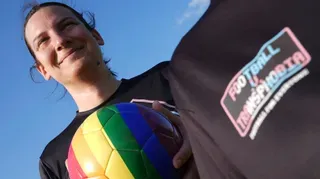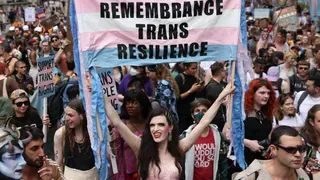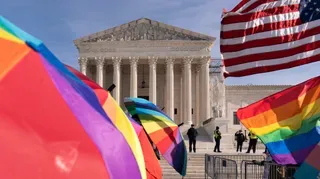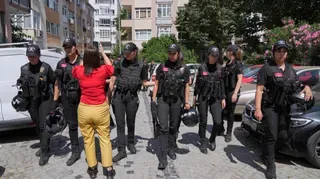May 9, 2009
Lebanese gays take fight for their rights public
David Foucher READ TIME: 3 MIN.
BEIRUT - In the Arab world, where several nations have seen killings of gay men in recent months, it can be startling to see a rainbow flag unfurled in public.
But the region's only overt gay rights organization, based in Lebanon, says it is slowly making progress in preventing discrimination and violence.
Now the group, Helem, is preparing for a campaign to overturn the law that makes homosexuality illegal.
In a dramatic step, Helem organized what may have been the only gay rights protest in the Arab world. In February, nearly two dozen gays and lesbians waved rainbow flags in a downtown Beirut square, carrying banners demanding homosexual rights. They protested what they said was the beating of two gay men by police.
It has been several years since a man was thrown in prison for being gay, said Helem activist Charbel Maydaa. But Lebanon's Article 534, which prohibits having sexual relations that "contradict the laws of nature," remains a threat.
"One of the major problems we face is that some parents threaten their gay children with article 534," he said.
Helem is treading carefully. The group, founded in 2004, is talking with legal experts on how to approach lawmakers and lobby to have Article 534 abolished. Helem members would not comment on how they intend to carry out the campaign.
It's a delicate process, given the deep-seated taboo in Arab countries against even discussing homosexuality. Everyone from religious leaders to family members condemn homosexuality. Human rights groups in other countries, like Egypt, often avoid dealing with issues touching on persecution of gays and lesbians.
The region has seen a recent spike in killings of homosexuals, blamed by some on the influence of Islamic extremists. In Iraq, the bodies of six men believed to be gay were found in the Shiite district of Sadr City in March and April, after a Shiite cleric repeatedly condemned homosexuals during Friday prayer sermons.
A 44-year-old gay man was shot to death in the Yemeni city of al-Hisn in early March - believed to be the ninth homosexual killed in southern Abyan province since late last year. Islamic militants have become strong in the area.
Governments have also conducted occasional crackdowns on gays - including a 2001 sweep in Egypt in which 52 men were arrested in a well-known gay hangout. In 2005, 35 men were arrested in Saudi Arabia for suspected homosexuality, according to international human rights groups.
And almost all countries in the region have laws banning sexual relations "against nature" - used to prosecute gays.
Lebanese lawmaker Ghassan Mokheiber, who is active on human rights issues, says it could take years to annul Article 534.
"We have to try convince some of our colleagues that this (homosexuality) is a normal matter," he told The Associated Press last week. "We have traditions that we have not been able to get beyond."
But Lebanon also has a long tradition of liberalism. That allows some openness for gays and lesbians, particularly in the capital, Beirut, which is home to a number of clubs where gays mingle freely.
Still, harassment occurs. Alexander, a gay man at the February protest, said he was recently beaten up by two men on a motorcycle as he walked in a Beirut suburb. The two attacked the 27-year-old after he ignored them.
"They broke my glasses, bruised my face and caused several injuries in my body," said Alexander, who spoke on condition he be identified by his first name only for fear of further harassment. "People in the street watched without coming to defend me."
Most of Helem's work has been behind the scenes, contacting police, religious leaders, employers, even parents to resolve specific cases of discrimination.
Helem's president, Georges Azzi, said treatment by police has improved in recent years.
But last year, a murdered man was discovered to have been gay, and police rounded up several of his friends for questioning, Azzi said. The men were forced to undergo rectal exams meant to determine if they were gay, then were "verbally and physically abused," he said.
"It is a very humiliating test," Azzi said. "We intervened and got them out, but they were traumatized."
Helem is funded by local and European non-governmental organizations. The word "Helem" is the Arabic acronym of Lebanese Protection for Lesbians, Gays, Bisexuals, Transgenders and Queers.
It is also Arabic for "dream."
___
On the Net:
http://www.thepetitionsite.com/1/abolish-article-534-of-the-lebanese-penal-code
David Foucher is the CEO of the EDGE Media Network and Pride Labs LLC, is a member of the National Lesbian & Gay Journalist Association, and is accredited with the Online Society of Film Critics. David lives with his daughter in Dedham MA.







